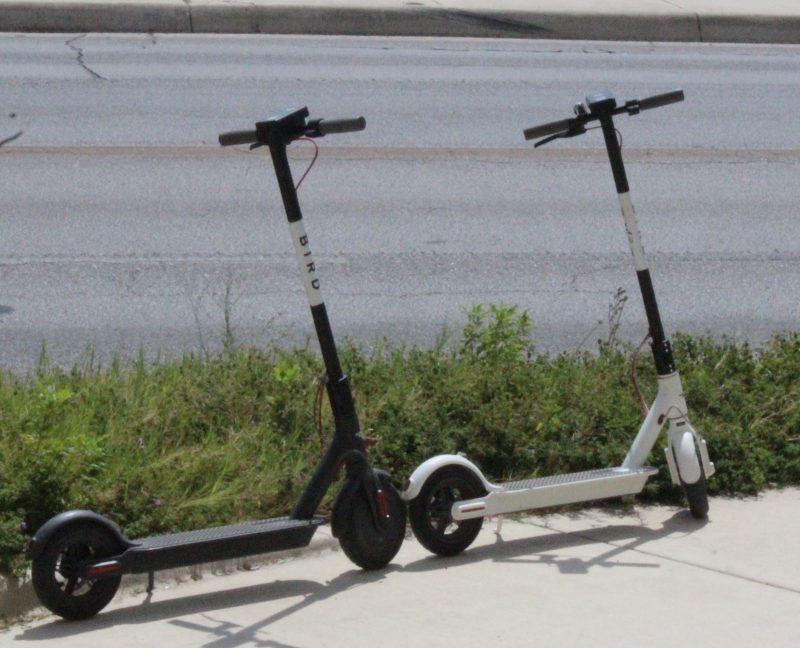Electric scooters run by the Bird company are finally making their way onto the Trinity campus after their introduction to San Antonio in late June. Students have taken the opportunity to zip around campus and to the nearby St. Mary’s Street on the Birds.
Birds are electric scooters that are available for rent through the Bird company app. Bird is active in 39 U.S. cities as well as Paris and Tel Aviv.
Bird also has a partnership with universities Abilene Christian University (ACU) and the University of Memphis. ACU’s student government association president, senior Ty Kelley, introduced the concept to ACU about a partnership with Bird.
“It just makes sense to partner with Bird. Birds add a lot of benefit to students,” wrote Kelley in an email interview. “Not only can students get a quick, inexpensive ride across campus, Birds have also helped with our parking situation. Students no longer dread when they can’t find a parking spot close to campus because they can just hop on a Bird.”
ACU and Bird have an indemnification agreement between them in which Bird has agreed to take full liability.
“[Bird] also give[s] their university partners $1 per day per scooter that is nested on campus. We are able to use this money to improve sidewalks, add signage and make our campus increasingly ‘Bird-friendly,’ ” Kelley wrote.
Paul Wright, director of business operations at Trinity, thinks that the process of integrating Birds on campus would be complicated. Campus policies and procedures would have to be changed and made to allow scooters on campus and to control their usage on campus.
Business operations would have to work with risk management, TUPD, university leadership and the company to bring Birds to campus. Additionally, Wright brought up the issue of the layout of the campus, and that scooters may not be very handy when navigating to upper campus.
While the process of bringing Birds to campus may be difficult, Wright understands that they might be beneficial to Trinity students.
“We’re not well-versed because [partnerships with Bird are] so new, so we’re not sure how they work,” Wright said. “But if students would like to see it on campus, then I certainly don’t mind taking a look at it! Seeing [Bird’s] information, talking to them. We could certainly try!”
Kelley, ACU’s SGA president, advocates for universities to partner with Bird.
“Bird was a great fit for our campus due to our smaller student population,” Kelley wrote. “I think any university that has Birds on their campus already, but doesn’t have an agreement with the company, is missing out on some great benefits.”
In the meantime, Bird scooters are still available for rent throughout the city and campus. Christine Drennon, professor of urban studies, has seen a large increase in the scooters all throughout the city of San Antonio.
“I’ve even seen them on the grassy strips in my HEB parking lot, and I live near westside — which is not where many would think that people who use scooters would live and/or shop — so they’re appealing to lots of people, not just young hipsters,” Drennon said.
Drennon supports the idea of introducing more Birds on campus.
“Why not? If we can work out how to keep people safe and not have them littering up the city, which is beginning to happen, then they can become a new form of transportation,” Drennon said.
Sophomore Brianna Pena holds an opposing view.
“I do think they’re a good form of transportation but I think the amount that we have right now is really good because there’s not too many but they’re still available,” Pena said.
Sophomores Ethan Jones and Sam Gustafsson, both frequent users of the scooters, agree that there should be more Bird scooters on campus.
“I think there should be more scooters on campus because it will help people increase their productivity on campus because they can get to places faster,” Jones said. “And I think it’s just really fun. It allows students to have more fun on campus.”
Gustafsson lives in Prassel and uses the scooters to get from the dorms to upper campus and Mabee faster.
“I think there should be more Birds on campus. It doesn’t have to be a ton, just a few, because a lot of times when I want to use one they’re not available,” Gustafsson said.








Mark • Sep 14, 2018 at 1:21 pm
Great read!